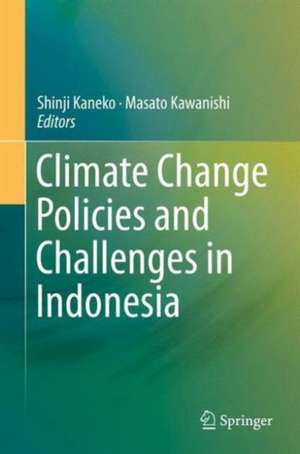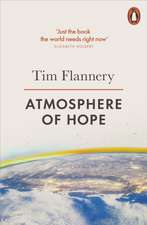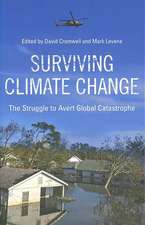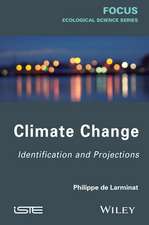Climate Change Policies and Challenges in Indonesia
Editat de Shinji Kaneko, Masato Kawanishien Limba Engleză Hardback – iun 2016
The book provides first-hand knowledge and data on energy and the institutional realities in Indonesia, which are not widely and readily available to an international audience. It offers a valuable reference guide for professionals working for governments and NGOs and donor agencies in the fields of climate change and development in developing countries. This work is also a valuable resource for undergraduate and graduate students of economics and environmental and development studies, in particular those who are interested in the synergies and conflicts between climate change and development.
| Toate formatele și edițiile | Preț | Express |
|---|---|---|
| Paperback (1) | 563.08 lei 38-44 zile | |
| Springer – 7 iun 2018 | 563.08 lei 38-44 zile | |
| Hardback (1) | 583.92 lei 38-44 zile | |
| Springer – iun 2016 | 583.92 lei 38-44 zile |
Preț: 583.92 lei
Preț vechi: 729.90 lei
-20% Nou
Puncte Express: 876
Preț estimativ în valută:
111.73€ • 116.66$ • 92.47£
111.73€ • 116.66$ • 92.47£
Carte tipărită la comandă
Livrare economică 01-07 aprilie
Preluare comenzi: 021 569.72.76
Specificații
ISBN-13: 9784431559924
ISBN-10: 4431559922
Pagini: 272
Ilustrații: XIV, 322 p. 119 illus., 66 illus. in color.
Dimensiuni: 155 x 235 x 25 mm
Greutate: 0.79 kg
Ediția:1st ed. 2016
Editura: Springer
Colecția Springer
Locul publicării:Tokyo, Japan
ISBN-10: 4431559922
Pagini: 272
Ilustrații: XIV, 322 p. 119 illus., 66 illus. in color.
Dimensiuni: 155 x 235 x 25 mm
Greutate: 0.79 kg
Ediția:1st ed. 2016
Editura: Springer
Colecția Springer
Locul publicării:Tokyo, Japan
Public țintă
ResearchCuprins
Foreword.- Preface.- PART I: Climate Change, Policies and Institutions.- PART II: Climate Change Sectoral Challenges.
Textul de pe ultima copertă
This book demonstrates the challenges and opportunities of climate change actions in developing countries and primarily focuses on case studies in Indonesia, the world’s fourth most populous country. The most important feature of the book is its examination of multiple facets of climate change issues in Indonesia, which allows readers to understand the complexity of climate change in developing countries: the synergies and trade-offs between different climate change actions as well as between climate and development priorities. Another unique feature is that it was jointly written by Indonesian and international authors, as well as by academics and development practitioners. This book addresses questions concerning mitigation measures in major sectors with original analyses of aspects including energy subsidies, sectoral energy efficiencies in manufacturing sectors, forest concessions, energy-saving labeling schemes, policy mixes for the urban transportation sector, and the introduction of waste-to-energy technologies.
The book provides first-hand knowledge and data on energy and the institutional realities in Indonesia, which are not widely and readily available to an international audience. It offers a valuable reference guide for professionals working for governments and NGOs and donor agencies in the fields of climate change and development in developing countries. This work is also a valuable resource for undergraduate and graduate students of economics and environmental and development studies, in particular those who are interested in the synergies and conflicts between climate change and development.
The book provides first-hand knowledge and data on energy and the institutional realities in Indonesia, which are not widely and readily available to an international audience. It offers a valuable reference guide for professionals working for governments and NGOs and donor agencies in the fields of climate change and development in developing countries. This work is also a valuable resource for undergraduate and graduate students of economics and environmental and development studies, in particular those who are interested in the synergies and conflicts between climate change and development.
Caracteristici
Provides an overview of fundamental elements in climate change policy such as detailed data on energy consumption, GHG emissions inventories, and institutional structures for coping with climate change mitigation and adaptation Addresses selected interesting questions of mitigation measures in major sectors with original analyses Discusses monitoring and evaluation of adaptation from the actual case in Indonesia to build a common understanding of success in achieving climate resilience Includes supplementary material: sn.pub/extras










